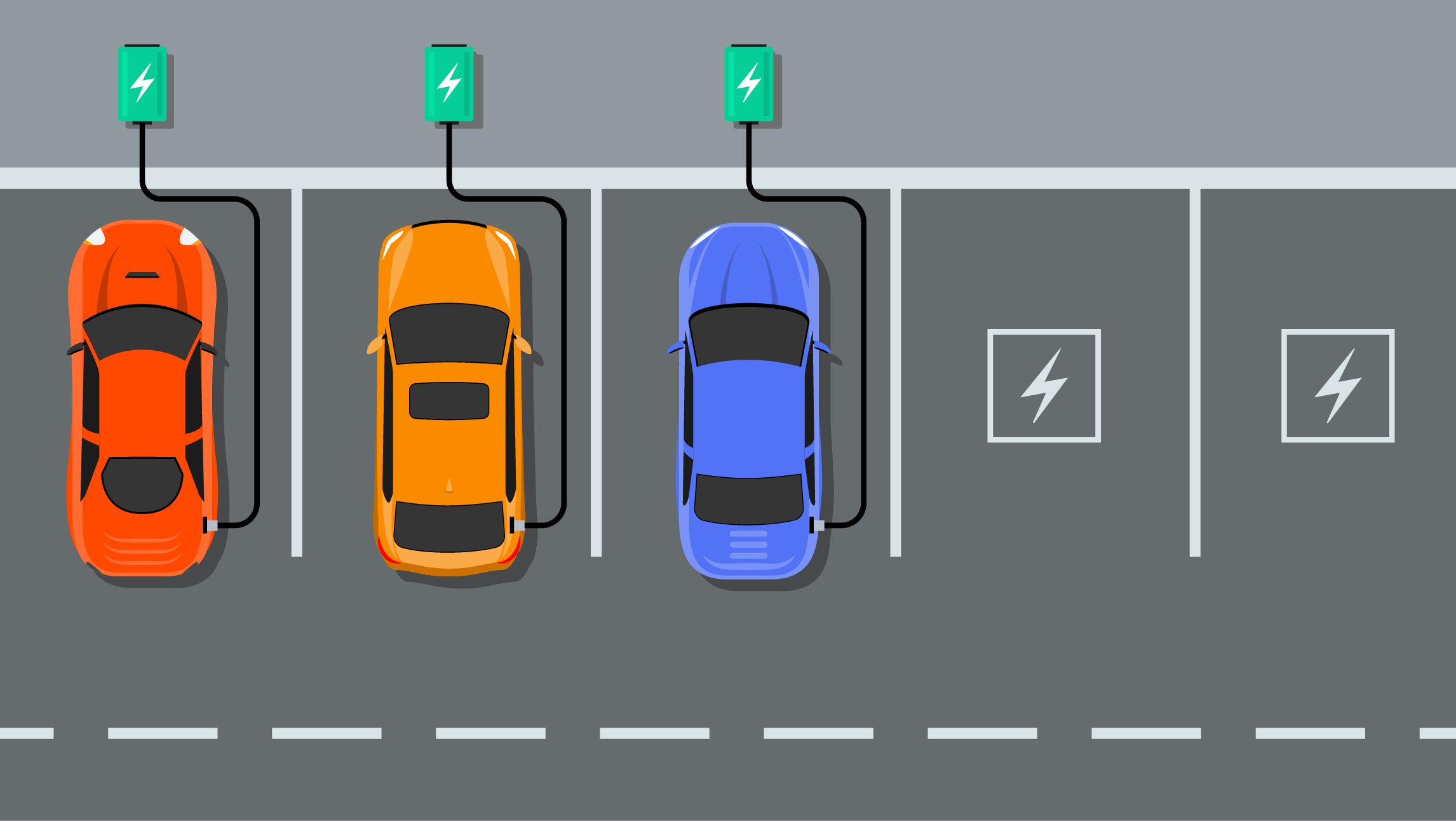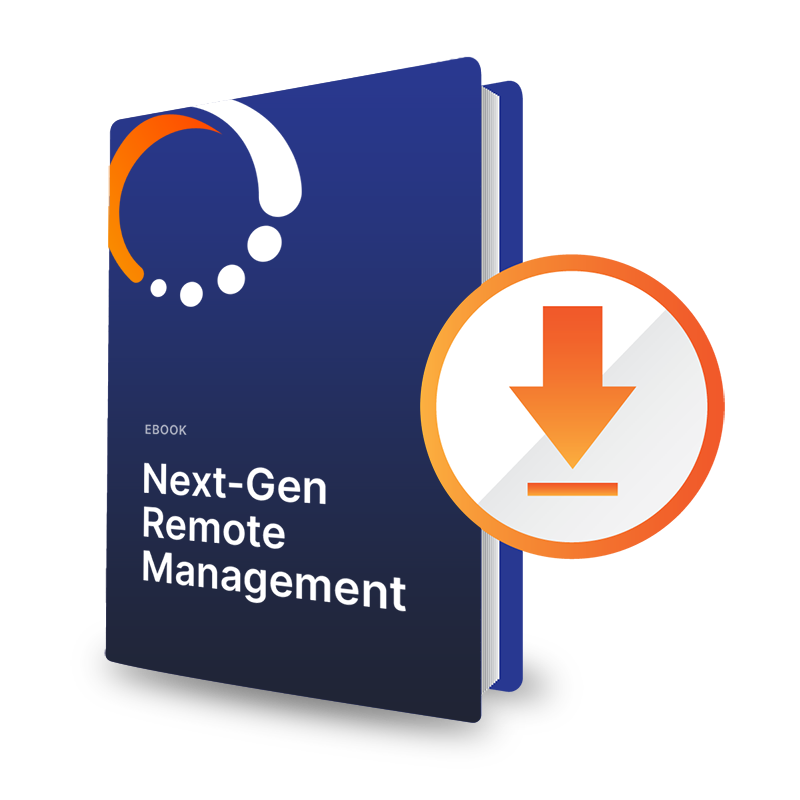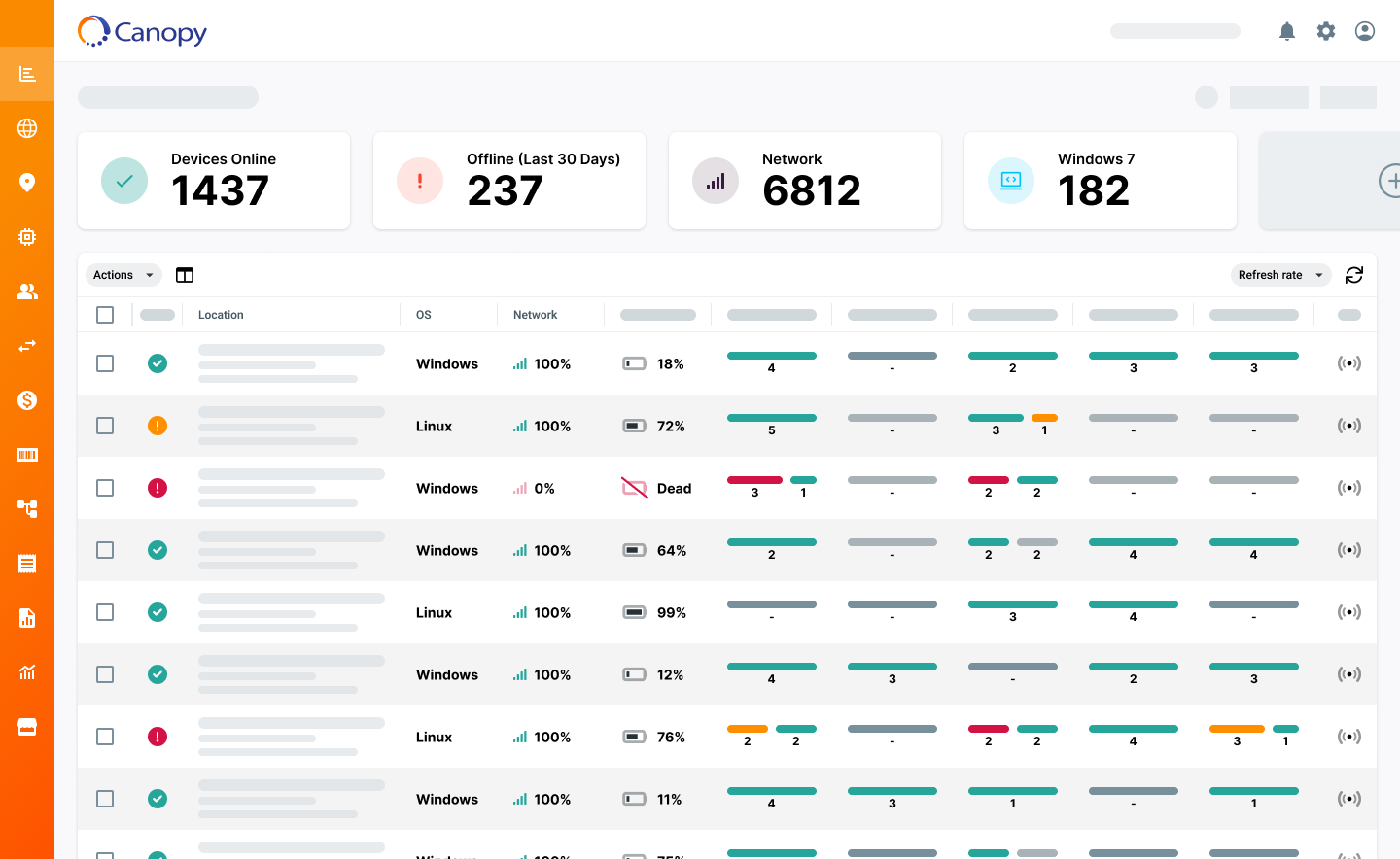How RMM Can Minimize Downtime and Improve Reliability for EV Charging Stations
The post discusses the rapid expansion and challenges with EV charging stations, highlighting the crucial role of RMM solutions to minimize downtime and ensure station reliability.

The electric vehicle (EV) charging station market is in a transformative phase of rapid growth and adoption. Over the past three years, the global number of public EV charging stations has grown by 60% annually and is projected to reach a total market size of $141 billion by 2030, a 36% compound annual growth rate (CAGR) over that period.
Any time a new hardware technology is rapidly deployed, it comes with a myriad of challenges such as infrastructural inadequacies, technological limitations, regulatory hurdles, or logistical complexities. For EV charging, these growing pains have combined to cause system reliability issues, negatively impacting consumer trust and the public perception of EVs. As a result, minimizing downtime is quickly becoming a core focus of EV charging station operators.
This post explores factors driving downtime challenges for EV charging stations by looking at current data and explores potential solutions by looking at historical precedents.
Explosive Growth Comes with Heightened Responsibility
The explosive growth in the EV charging station market is a direct result of solution providers and operators vying for market leadership positions. As companies scramble to capture market share there is an urgency to be first to market, often leading to a critical oversight in planning for uptime and availability. In their zeal to ride the growth trends, many providers prioritize the size of their charging network over the quality of service they provide.
This lack of thorough planning and execution can result in operational stress fractures. The infrastructure required to scale these services while maintaining high levels of reliability is complex and demanding. As a result, this will strain existing operational framework, leading to issues in maintenance, support, and overall functionality of the charging stations.
One significant consequence of this oversight is increased downtime for charging stations. When charging stations are not as reliable or available as required, it can lead to significant inconvenience for EV owners. This, in turn, can frustrate consumers and potentially impede the wider adoption of electric vehicles. Reliability and consistency are crucial in building consumer trust in new technologies, and any hindrance in these areas can have a ripple effect on the perception and adoption of EVs.
Leveraging History to Anticipate Trends and Challenges
The current surge in the EV charging station market mirrors the trajectories of industries that have previously undergone similar periods of hyper-growth and transformation. By examining these historical precedents, we can see the patterns and predict solutions that are likely to emerge in the EV charging infrastructure sector.
For example, telecommunications and Internet Service Providers (ISPs) encountered significant hurdles in maintaining network reliability as they grew swiftly in the 1990s and 2000s. In solar and wind farms, the difficulties posed by remote locations and variable environmental conditions necessitated the implementation of comprehensive monitoring systems. This was vital for ensuring consistent energy production. In both cases, the challenges of rapid expansion highlight the importance of robust management infrastructure to provide reliable and uninterrupted service. Breakdowns can lead to substantial revenue loss and erode customer trust, in some cases hurting adoption and slowing growth.
Drawing from these examples across different sectors, a common and critical observation emerges: minimizing downtime quickly becomes a core focus for operators. Whether it's ensuring seamless communication, consistent energy supply, or uninterrupted retail operations, minimizing downtime is a key factor that underpins the success and resilience of these industries. It's not just a goal but a fundamental requirement for maintaining service quality, customer satisfaction, and operational viability.
The Importance of Minimizing Downtime for the EV Market
A study conducted by J.D. Power in 2023 found that users were unable to charge their vehicles 20% of the time due to charging stations being out of service or experiencing downtime. In their 2021 report, it noted that “responders couldn’t charge their vehicles because the charger was out of service, had software glitches, payment processing errors, or vandalism.”

The availability and reliability of EV charging stations are not just a matter of convenience. In a market where consumer confidence is still developing, the negative impact of downtime can be profound. A study by J.D. Power 2022 U.S. Electric Vehicle Experience (EVX) Public Charging Study illustrates this point by highlighting that charger reliability is a key factor affecting overall customer satisfaction. The study found that satisfaction levels plummet when EV drivers encounter non-functional charging stations.
It’s clear that minimizing downtime for Electric Vehicle (EV) Charging Stations is a critical enabler for the industry to move its potential. To achieve this, the integration of effective Remote Monitoring and Management software and processes must be a strategic imperative. This technology is not merely an add-on; it's a fundamental component in enhancing the reliability and efficiency of EV Charging Stations.
The Role of Remote Monitoring and Management Solutions
Incorporating advanced remote monitoring and management (RMM) solutions empowers EV Charging Station operators to proactively address issues before they escalate into downtime experiences for customers. The software helps ensure charging stations remain operational, playing a crucial role in maintaining the integrity and trustworthiness of EV charging infrastructures.
RMM software does this by maintaining a real-time connection with distributed EV charging stations, providing continuous visibility into the status and performance health of the charger and all its critical components, regardless of their geographical location. This real-time monitoring is not just about observing the current state of the stations, but also about anticipating and identifying potential issues before they escalate into significant problems. By receiving instant alerts and detailed diagnostics, operators can quickly address issues before they disrupt the charging services, thereby significantly reducing the likelihood of prolonged downtimes or onsite technician visits.
Moreover, the automation capabilities integrated into RMM software are instrumental in enhancing the efficiency of operations. These systems can automatically perform routine checks and maintenance tasks, freeing up human resources for more complex and critical issues. This automation extends to the proactive management of potential downtime causes, such as software updates, hardware malfunctions, or network connectivity issues. By automating responses to common problems, RMM software ensures that these issues are resolved swiftly, often without the need for manual intervention.
RMM software also provides valuable analytics and insights, enabling operators to make informed decisions about maintenance, upgrades, and expansion. This proactive approach to management, powered by the sophisticated capabilities of RMM software, is key in maintaining high uptime for EV charging stations and advancing the reliability of EV infrastructure as a whole.

Avoiding RMM Mistakes and Making the Right Decision
History has shown that in rapidly expanding industries like the EV charging station market, operators often make two critical missteps when addressing gaps in remote monitoring. Firstly, some operators attempt to build their own remote monitoring and management (RMM) systems. This approach, while seemingly tailored, can become a significant problem down the road. It distracts operators from their core business, diverting valuable resources into an area that demands substantial investment and expertise outside their primary domain.
Secondly, others might opt for an "off the shelf" RMM product, hoping for a quick fix to complex operational challenges. However, this solution often falls short, as many available RMM tools are not equippedv to handle the nuanced demands of a sophisticated and newly established market like EV charging. On top of the solution being unique and complex, regulatory requirements are evolving, requiring RMM solutions to easily adapt to these evolving requirements. Car and Driver referenced these evolving standards in September 2023
“Last year, state legislators passed a bill [AB 2061 of 2022] that requires all charging operators who receive state money to comply with new and more detailed standards for record-keeping and reporting.”
Off the shelf RMM solutions might provide basic functionality, but will fail to delve into the deeper, more intricate aspects of remote management, offering only surface-level benefits. Furthermore, these solutions will not be able to easily adapt to meet the needs of the operator as the industry continues to evolve.
Therefore, it's critical for operators to find an RMM solution that fits their unique needs. Ideally, the RMM provider has the necessary level of sophistication and adaptability to meet solution specifications without requiring expensive and time-consuming software engineering customizations. The right provider should possess "been there, done that" expertise, showcasing their capability not only through their operational experience but also through concrete case studies and testimonials from existing customers. This dual demonstration of expertise – both as operators themselves and as successful solution providers to others – is a key indicator of a provider's ability to deliver a truly effective and adaptable RMM solution. Such a provider will have a deep understanding of the challenges and nuances in the field, ensuring that their system is not just a generic tool, but a powerful, tailor-made solution capable of enhancing operational efficiency and reducing downtime in the dynamic world of EV charging stations.

Conclusion
As we have discussed, the electric vehicle (EV) charging station market is at a critical point of rapid growth and transformation, facing a range of complexities from infrastructural demands to evolving regulatory landscapes. Central to these challenges is the imperative to minimize downtime, a key factor in ensuring the reliability of charging solutions and bolstering public trust in EV technology. The reliability of charging stations is fundamental to the practical viability of EVs as a mainstream transportation option and is essential for enhancing user experience and influencing public perception towards broader EV adoption.
Learning from other rapidly evolving industries, we recognize that a proactive, strategic approach is crucial. This includes the careful selection and implementation of Remote Monitoring and Management (RMM) solutions. These solutions must not only enable real-time monitoring, predictive maintenance, and efficient management but also be sophisticated and adaptable enough to meet the specific needs of The EV charging station market, including compliance with evolving regulatory standards. Avoiding the pitfalls of in-house development and generic "off the shelf" products is key to addressing the unique challenges this industry faces.
If you are part of a team overseeing a network of EV charging stations or similar smart devices and feel uncertain about where to start with remote monitoring and management, we would love to help provide guidance. Just reach out to us at info@goCanopy.com with the subject line “Free Strategy Session” to schedule a call with one of our technical subject matter experts. During these sessions we take a consultative approach, focusing on better understanding your specific solution requirements and business needs to understand if Canopy RMM may be a fit. We will provide you with clear, actionable insights on the best starting point for your Remote Device Management journey, including suggesting alternative RDM software platforms if they are more suited to your needs.
OTHER REFERENCES:
- "EV Charging Stations In The US Are Plagued By Reliability Issues: Study" from Inside EVs: This article references a study by J.D. Power, which found that the number of failed charging attempts is increasing, highlighting the reliability issues in the U.S. EV charging network.
- "Why America's EV chargers keep breaking" - POLITICO: This article discusses the challenges in building a reliable national EV charging network in the United States, emphasizing the need for high standards and customer satisfaction. It explores the evolution of charging stations as a consumer product and the complexities involved in their operation and maintenance.
- "It’s time to address a big issue with EV charging: reliability" - GreenBiz: This piece highlights the unreliability of EV charging, especially in DCFC stations, and the impact on consumer adoption and corporate fleets. It stresses the importance of focusing not only on deploying more stations but also on ensuring a reliable driver experience. The article also discusses the importance of redundancy and integration of technology with third-party services.
- "What Makes EV Charging Stations Fail?" - Car and Driver: This report quantifies the issues with public EV charging stations, including charging failures and equipment problems, and discusses the implications for EV drivers.
- "Study: Public Chargers Far Less Reliable Than Previously Reported" - InsideEVs: This article covers a study that highlights the disappointing reliability of public DC fast-charging stations, a crucial element of EV electrification.
- "Why America's EV chargers keep breaking" - POLITICO: This report looks into the various factors contributing to the unreliability of EV charging infrastructure in the US, including the design and operational challenges of the charging stations.
- The White House unveils new rules to try and keep China out of the US EV market: The White House has introduced new rules aimed at reducing foreign influence in the U.S. electric vehicle (EV) market. These rules, effective from 2024, disqualify EVs with components made by entities from China, Russia, Iran, or North Korea, highlighting growing supply chain complexity and disruption for EV charging station networks.













